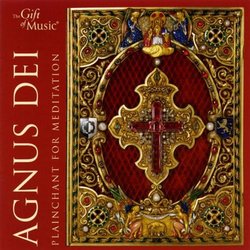Product DescriptionAngus Dei Plainsong for meditation An atmospheric medieval mass recorded by the men voices of Magdala, Oxford's finest early music choir. A sumptuous sound bringing the inner peace of this timeless music - Gregorian chant - which formed the bedrock of the liturgy of the early church and whose calm intensity still speaks to us with equal clarity today One of the greatest glories of the Medieval Christian church, plainchant is the musical equivalent of the sequences of Gothic arches of the cathedrals of Northern France, or the beautiful ornamentation of an otherwise plain façade of an Italian church or Spanish monastery. One of the greatest glories of the Medieval Christian church, plainchant is the musical equivalent of the sequences of Gothic arches of the cathedrals of Northern France, or the beautiful ornamentation of an otherwise plain façade of an Italian church or Spanish monastery. The early church quickly developed a detailed and highly organised pattern of worship, with different prayers and bible readings for each time of the day. These were known as the Offices. The Offices formed the basis of the liturgy and were in turn centred around the most important service of the day, the Mass, in which the body and blood, and the death and resurrection of Christ, were symbolically recalled. Plainchant developed as a musical way of expressing this liturgy. Tradition has it that all its disparate strands, melodies and types were categorised and ordered by Pope Gregory, whence comes its alternative name of Gregorian chant. Our music on this recording is taken from the Liber Usualis, a more modern equivalent of Gregory's work, although even this comprehensive volume of music has its roots in the nineteenth century. The Liber Usualis sets out the musical requirements of the liturgy as it follows the church's calendar, a cycle of worship based on the life of Christ, from Advent, when the birth of Christ is announced, through Christmas and Easter to the great Feast of the Trinity, in which God as Father, Son and Holy Spirit is fully acknowledged. Then, as with the seasons and the passing of year upon year, the cycle starts again with Advent. The music, always a single, unaccompanied melody, reflects the liturgical pattern of Offices and Mass, and changes its character appropriately. So the psalms are intoned in a simple way, as befits their status: clarity of text was essential to their understanding. But the more commonly repeated liturgical texts, or texts specific to a major Feast, perhaps because they were more familiar through greater repetition, acquired more complex and florid music. The words were so well known that expressing them clearly and simply was less important than allowing their message to be expressed in more flowing and ecstatic music. Both these types, the simple and the florid, can be heard here. Psalm tones and the Magnificat, (the words spoken by Mary upon learning that she was to become the Mother of God) are simple, almost sung on a single note. But the Magnificat is surrounded by an Antiphon, a text more associated with a particular Feast or moment in the church's calendar. And the music is appropriately rich and varied. For example, O quam suavis, the Magnificat Antiphon from the Feast of the Blessed Sacrament of Corpus Christi, is elaborate and varied. The Magnificat chant is simple. Tradition demanded that the Antiphon be repeated after the Magnificat. Its beauty and length allows time for reflection on Mary's words. This musical and liturgical pattern is repeated at various moments during prayer.


 Track Listings (22) - Disc #1
Track Listings (22) - Disc #1